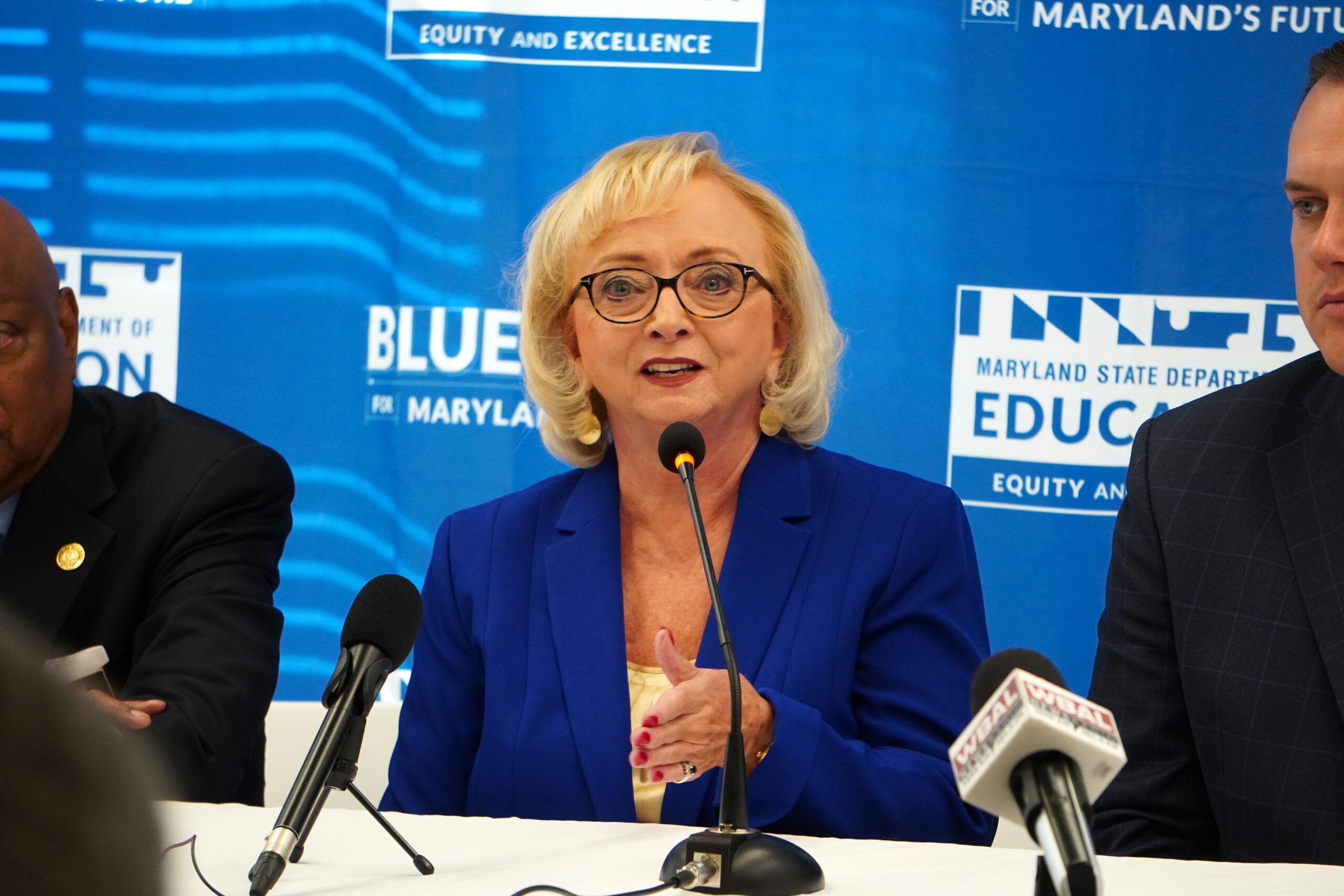Mississippi
Former Mississippi Schools chief aims to repeat learning ‘miracle’ in Maryland – Maryland Matters

This report is being published in collaboration with The 74, a nonprofit national education newsroom.
When Maryland hired a new state superintendent of schools in October, the reaction among education observers was one of excitement — mixed with a sense of relief.
Carey Wright, who has been appointed on an interim basis to complete the term of outgoing Superintendent Mohammed Choudhury, is a top-tier recruit with deep ties to Maryland. She spent decades working as a teacher and administrator in some of the state’s largest school districts before serving a nine-year stint as schools chief in Mississippi, where she was credited with leading a highly successful overhaul to literacy instruction.
Locals are hoping her appointment can jump-start a similar revival in Maryland, where pandemic-era learning loss has dealt a severe blow to student scores that once ranked among the best in the country. She will also be charged with steadying the Maryland State Department of Education after Choudhury’s rocky two-year tenure at its helm, which ended in September amid allegations that his leadership style created a “toxic” environment and caused friction with state authorities.
The uncertainty around Choudhury’s departure (he will continue to collect a salary and act as an advisor to the state board going forward) led to a dilemma that was only fitfully resolved, said Kalman Hettleman, a longtime education policy observer who has been highly critical of the former superintendent. While lambasting the lack of progress on lost learning in recent years, he called the board’s choice of Wright as his replacement a “grand slam” selection.
”It looked like we were stuck,” Hettleman said. “We’re un-stuck now.”
Still approved to serve only through the rest of Choudhury’s term, which ends next June, Wright has already announced that she intends to seek the job on a permanent basis. In her introductory press conference, she also seemed to hint that she would pursue a dedicated literacy strategy similar to the one she followed in Mississippi, noting that children must “learn to read in order to love to read.”
Wright’s time in the South coincided with one of the most impressive turnarounds in the history of American education. Between 2013 and 2022, Mississippi fourth graders made gigantic strides on both the reading and math sections of the National Assessment of Educational Progress, a federal exam commonly referred to as the Nation’s Report Card. While not improving as quickly, eighth graders also saw consistent growth in both subjects, and the success was spread widely among students of differing racial and socioeconomic backgrounds.
In all, elementary schoolers in Mississippi began the last decade mired among the lowest-performing students in the country and finished at or above the national average. In fact, a data tool devised by the nonprofit Urban Institute shows that Mississippi would be one of the top-performing states in the country if NAEP scores were adjusted for demographic factors such as race, poverty level, and special needs status.
By contrast, Maryland has experienced a steady decline in achievement over the same 10-year span, and its fourth graders now read and compute at a lower level than Mississippi’s. This in spite of the fact that Mississippi is one of the poorest states in the U.S. and Maryland one of the richest; according to an estimate by the National Education Association, Maryland spends approximately 56 percent more on each of its pupils than does Mississippi. The release of state standardized test scores this summer showed that while slightly more students passed Mississippi’s exams than in 2019, Maryland pupils are still lagging behind their pre-pandemic performance.
Annette Campbell Anderson, an assistant professor at the Johns Hopkins School of Education and deputy director of the university’s Center for Safe and Healthy Schools, said the “abysmal” scores caused consternation among the state’s education community.
“Everyone has recoiled a bit because Maryland is so used to being in the upper echelons of achievement for both literacy and math,” Anderson said. “Now it feels like we’re stuck in the middle.”
Battling ‘complacency’ on reading
Wright’s task will be to replicate a version of what she executed in her last stop.
Mississippi’s rapid improvement came only after policymakers there — including, but not limited to, its superintendent — fundamentally shifted the state’s approach to instruction and accountability, with a particular focus on reading. Teachers and administrators were provided with special, evidence-based training; literacy coaches were dispatched to schools that struggled with the subject; and in many instances, kids who couldn’t pass a reading test at the end of the third grade had to repeat the year in school.
The approach reflects a focus on what educators call the “science of reading,” the wide body of psychological and neuroscientific research into how people come to understand the written word. In the last decade, dozens of states have passed laws informed by that research and designed to put children on a path to reading proficiency by the end of the third grade. Maryland has not.
Instead, the state has concentrated on rolling out a separate policy, called the Blueprint for Maryland’s Future. Estimated to add nearly $4 billion in education spending annually once it is fully implemented in the 2030s, the plan seeks to provide more resources to schools serving poor students, extend public pre-K offerings and raise teacher salaries, among other priorities. Its ambition and cost have made it one of America’s most-watched education reforms, but Hettleman said that the Blueprint’s authors didn’t sufficiently emphasize the kind of changes necessary to improve reading results.
“The legislative leadership in Maryland thought that the Blueprint was the be-all, end-all, cure-all for everything, and it wasn’t,” Hettleman said. “That bred a kind of complacency as other states developed specific reading initiatives.”
Wright, who declined an interview request, will now have responsibility for making the plan work. In part, her duties will include mending relationships with Maryland education authorities, including the state board of education, which were frayed under Choudhury’s leadership. A number of high-ranking employees at the state Department of Education quit during 2022, with some complaining of the then-superintendent’s allegedly brusque manner. He also attracted criticism for his habit of addressing subordinates through encrypted messages on his personal phone.
The effects of the previous years’ staff departures are still to be seen. Employee directories at the departmental website were last updated in 2022, and former senior officials have warned of “brain drain” as years of organizational experience are lost, whether due to clashes with Choudhury or more conventional turnover. This spring, the department announced it would return over $800,000 in federal funding for salaries and professional development in the area of career and technical education, a move that some former staffers attributed to inaction by leadership.
In the final months of Choudhury’s tenure, the department announced that it had reduced its job vacancy rate by over 50 percent. But even that progress wouldn’t solve the atrophy of staff experience and relationships, Anderson said.
“People I had historically worked with at the Maryland State Department of Education — who I’d had as colleagues for years — very few of them have remained at the department,” she noted. “Whether or not the positions are filled, we have to go back to the brass tacks of getting to know who people are, and all our institutional knowledge has been swept away.”
In an October exit interview with The 74’s Beth Hawkins, Choudhury lamented that he had not “spent more time engaging, talking to people who are power brokers, who have more political capital, who have the ability to ultimately be for or against something and can either work against you or for you.”
Supporters of Wright say that her extensive background as a former state schools chief shows that she is able to productively collaborate with the wide array of constituencies that will determine the success of her agenda: the state board, teachers’ unions and local districts, which have traditionally operated with considerable autonomy in Maryland.
In particular, she may need to repair her department’s relationship with the Accountability and Implementation Board, the body specifically charged with overseeing the Blueprint over the next decade. Earlier this year, the board and the superintendent’s office publicly clashed over which entity had the authority to approve districts’ plans to enact Blueprint-related policies.
Brit Kirwan is the former chancellor of the University System of Maryland and served as the chair of the state’s Commission on Innovation and Excellence in Education, the recommendations of which helped produce the Blueprint. Noting the difficulty of leading an academic recovery in Maryland while simultaneously working to realize generational changes in education policy, he called Wright’s appointment “a gift from the gods.”
“We’re undertaking a degree of reform that is unprecedented in the United States,” Kirwan said. “It requires enormous talent for an administrator in organization and collaboration and building broad bases of support to pull this off.”

Mississippi
Mississippi Highway Patrol urging travel safety ahead of Thanksgiving

The rest of the night will be calm. We’ll cool down into the mid to upper 50s overnight tonight. A big cold front will arrive on Thanksgiving, bringing a few showers. Temperatures will drop dramatically after the front passes. It will be much cooler by Friday! Frost will be possible this weekend. Here’s the latest forecast.
Mississippi
Ole Miss football vs Mississippi State score prediction, scouting report in 2024 Egg Bowl

OXFORD — There’s always an added element of intensity in the Egg Bowl.
It will be important for Ole Miss football (8-3, 4-3) to find an extra gear against Mississippi State (2-9, 0-7 SEC) in Friday’s rivalry matchup (2:30 p.m., ABC). The Rebels are coming off a deflating loss at Florida that left Ole Miss’ College Football Playoff hopes hanging by a thread.
Mississippi State is slogging through a difficult year under first-year head coach Jeff Lebby. While first-year head coaches have fared surprisingly well in Egg Bowl games over the years, the Rebels will be heavy favorites at Vaught-Hemingway Stadium on Black Friday. The game is just the second Egg Bowl in eight years not to be played on Thanksgiving.
Let’s dive into the matchup:
Why Jaxson Dart, Rebels’ offense should be able to extend drives
Usually defenses that force opposing into offenses into third-down situations fare well. For Mississippi State, completing the job on third down has been difficult.
The Bulldogs have allowed SEC opponents to convert on 70 of 147 third downs. That is 47.6%, and the worst mark in the SEC. Ole Miss’ defense, by comparison, is No. 5 in the SEC at 32%.
More broadly, the Bulldogs’ defense has been getting gashed in SEC play. Mississippi State has allowed 40.7 points per SEC game. Even if star Ole Miss receiver Tre Harris is out because of an injury, the Rebels have a good opportunity to light up the scoreboard like they did in a 63-31 win at Arkansas.
Can Ole Miss rack up the sacks, keep Dart upright?
Stats indicate Friday’s game will be easier for Ole Miss quarterback Jaxson Dart than Mississippi State quarterback Michael Van Buren Jr.
Mississippi State has allowed 35 sacks against SEC opponents. The inverse also bodes poorly for the Bulldogs. Mississippi State is last in the SEC in sacks. In 11 SEC games, the Bulldogs have just eight.
To make it harder on Van Buren Jr., Ole Miss’ defense leads the SEC in sacks. Look for him to get pressured early and often by a ferocious defensive line. There could − and maybe should − be two or three Rebels with multiple sacks in the Egg Bowl.
Rebels rushers Princely Umanmielen and Suntarine Perkins are prime candidates to feast. They each have 10.5 sacks, which ties them for No. 6 in the nation.
Will Ole Miss try to run up the score on the Bulldogs?
Aside from satisfying its fan base in a heated rivalry, Ole Miss has another reason to try to win big against Mississippi State. It’s the Rebels’ last chance to impress the College Football Playoff Committee.
Because of chaos in Week 13, the Rebels can still cling to an outside shot at making the College Football Playoff. While the Rebels will need other teams to lose Saturday, a dominating win Friday will only help their case.
On the flip side, even a narrow win against a Mississippi State team that hasn’t won a Power Four game this season would make it easier for the committee to exclude the Rebels.
Ole Miss football vs Mississippi State Egg Bowl score prediction
Ole Miss 42, Mississippi State 9: Each of the Rebels’ SEC games has resulted in one of two things: a close loss or blowout win. Expect the latter in the final regular season game at Vaught-Hemingway Stadium. Ole Miss has the pass rush to create turnovers that will overwhelm an outmatched Bulldogs team.
Sam Hutchens covers Ole Miss for the Clarion Ledger. Email him at Shutchens@gannett.com or reach him on X at @Sam_Hutchens_
Mississippi
Voters will choose judges for Mississippi's top courts in runoff elections

JACKSON, Miss. — Mississippi voters will decide winners for one seat on the state Supreme Court and one on the state Court of Appeals.
Runoff elections are Tuesday between candidates who advanced from the Nov. 5 general election. Polls are open 7 a.m.-7 p.m. central.
Voter turnout typically decreases between general elections and runoffs, and campaigns say turnout could be especially challenging two days before Thanksgiving.
Supreme Court
Supreme Court Justice Jim Kitchens is seeking a third term and is challenged by state Sen. Jenifer Branning.
They are running in District 1, also known as the Central District, which stretches from the Delta region through the Jackson metro area and over to the Alabama border.
Branning received 42% in the first round of voting, and Kitchens received 36%. Three other candidates split the rest.
Mississippi judicial candidates run without party labels, but Democratic areas largely supported Kitchens on Nov. 5 and Republican ones supported Branning.
Mississippi Supreme Court Presiding Justice James W. Kitchens asks a question, July 6, 2023, before the court in Jackson, Miss. Credit: AP/Rogelio V. Solis
Branning is endorsed by the state Republican Party. She calls herself a “constitutional conservative” and says she opposes “liberal, activists judges” and “the radical left.”
Kitchens is the more senior of the Court’s two presiding justices, putting him next in line to serve as chief justice. He is endorsed by the Southern Poverty Law Center’s Action Fund, which calls itself “a catalyst for racial justice in the South and beyond.”
In September, Kitchens sided with a man on death row for a murder conviction in which a key witness recanted her testimony. In 2018, Kitchens dissented in a pair of death row cases dealing with the use of the drug midazolam in state executions.
Court of Appeals
The Court of Appeals runoff is in District 5 in the southeastern corner of the state, including the Gulf Coast.
Senate Elections Committee Chair Jenifer Branning, R-Philadelphia, explains a facet of an absentee-ballot bill during floor debate at the Capitol in Jackson, Miss., June 15, 2020. Credit: AP/Rogelio V. Solis

Amy St. Pe’ and Jennifer Schloegel advanced to the runoff from a three-way contest, with St. Pe’ receiving 35% of the vote on Nov. 5 and Schloegel receiving 33%. The runoff winner will succeed Judge Joel Smith, who did not seek reelection.
St. Pe’ is a municipal judge in Gautier. Schloegel is a chancery court judge in Hancock, Harrison and Stone counties.
-

 Science1 week ago
Science1 week agoTrump nominates Dr. Oz to head Medicare and Medicaid and help take on 'illness industrial complex'
-

 Politics1 week ago
Politics1 week agoTrump taps FCC member Brendan Carr to lead agency: 'Warrior for Free Speech'
-
/cdn.vox-cdn.com/uploads/chorus_asset/file/25739950/247386_Elon_Musk_Open_AI_CVirginia.jpg)
/cdn.vox-cdn.com/uploads/chorus_asset/file/25739950/247386_Elon_Musk_Open_AI_CVirginia.jpg) Technology1 week ago
Technology1 week agoInside Elon Musk’s messy breakup with OpenAI
-

 Lifestyle1 week ago
Lifestyle1 week agoSome in the U.S. farm industry are alarmed by Trump's embrace of RFK Jr. and tariffs
-

 World1 week ago
World1 week agoProtesters in Slovakia rally against Robert Fico’s populist government
-

 Health4 days ago
Health4 days agoHoliday gatherings can lead to stress eating: Try these 5 tips to control it
-

 News1 week ago
News1 week agoThey disagree about a lot, but these singers figure out how to stay in harmony
-

 Health1 day ago
Health1 day agoCheekyMD Offers Needle-Free GLP-1s | Woman's World















